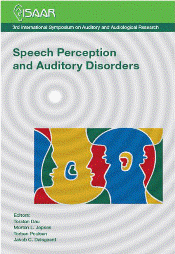Prosody perception in simulated cochlear implant listening in modulated and stationary noise
Abstract
Cochlear Implant (CI) listeners can do well when attending to speech in quiet, yet challenging listening situations are more problematic. Previous studies have shown that fluctuations in the noise do not yield better speech recognition scores for CI listeners as they can do for normal hearing (NH) listeners. The aim of this experiment was to investigate the ability of simulated CI listeners in a prosodic task, where F0 Just Noticeable Differences (JND) were measured in modulated and stationary background noise. A nonsense sentence was created from a recording with durations and overall contour derived from non-scripted Danish speech. The F0 temporal midpoint of the initial syllable was varied stepwise in semitones. Competing signals of modulated white noise and speech shaped noise at 0 dB and 12 dB SNR, were added to the tokens prior to 8-channel noise- excited vocoder processing. Stimuli were presented diotically to 8 NH listeners in a 2AFC task. A question/statement identification experiment was also performed. Results from the JND experiment indicate a significant noise effect for the modulated noise condition at the lower SNR.
References
Dorman, M. F., Loizou, P. C., and Rainey, D. (1997). “Speech intelligibility as a function of the number of channels of stimulation for signal processors using sine-wave and noise-band outputs” J. Acoust. Soc. Am., 102, 2403-2411.
Festen, J. M., and Plomp, R. (1990). “Effects of fluctuating noise and interfering speech on the speech-reception threshold for impaired and normal hearing” J. Acoust. Soc. Am., 88, 1725-1736.
Gfeller, K., Turner, C., Mehr, M., Woodworth, G., Fearn, R., Knutson, J. F., and Stordahl, J. (2002). “Recognition of familiar melodies by adult cochlear implant recipients and normal-hearing adults” Cochlear Implants Int., 3, 29-53.
Grønnum, N. (2007). ”Rødgrød med Fløde. En lille bog om dansk fonetik” [Red pudding with cream. A little book on Danish phonetics] Akademisk Forlag. Howard-Jones, P. A., and Rosen, S. (1993). “Uncomodulated glimpsing in ‘checkerboard’noise” J. Acoust. Soc. Am., 93, 2915-2922.
Lieberman, S., and Michaels, T. (1962). “Some aspects of fundamental frequency and envelope amplitude as related to the emotional content of speech” J. Acoust. Soc. Am., 34, 922-927.
Meister, H., Landwehr. M, Pyschny, V., Wagner, P., and Walger, M. (2010). “The perception of sentence stress in cochlear implant recipients” Ear Hear, 32, 1-9. Møller, V., and Post, I. (1997). “Voksne med cochleaimplantat” [Adults with cochlear implants] Materiale til iagttagelse.
Nelson, P. B., Jin, S., Carney, A. E. and Nelson, D. A. (2003). “Understanding speech in modulated interference: Cochlear implant users and normal-hearing listeners” J. Acoust. Soc. Am., 113, 961-968.
Qin, M. K., and Oxenham, A. (2003). “Effects of simulated cochlear-implant processing on speech reception in fluctuating maskers” J. Acoust. Soc. Am., 114, 446-453.
Souza, P. and Rosen, S. (2009). “Effects of envelope bandwidth on the intelligibility of sine- and noise-vocoded speech” J. Acoust. Soc. Am., 126, 792-805. Thorsen, N. (1978). “An acoustical analysis of Danish intonation” J. Phonetics 6, 151-175.
Tøndering, J. (2008). ”Skitser af prosodi i spontant Dansk” [Sketches of prosody in spontaneous Danish] Ph.D. thesis.
Uchanski, R. M. (2011). “Listening to talkers and musical pitch” Presentation at Conference on Implantable Auditory Prostheses. July 2011, Asilomar, California.
Additional Files
Published
How to Cite
Issue
Section
License
Authors who publish with this journal agree to the following terms:
a. Authors retain copyright* and grant the journal right of first publication with the work simultaneously licensed under a Creative Commons Attribution License that allows others to share the work with an acknowledgement of the work's authorship and initial publication in this journal.
b. Authors are able to enter into separate, additional contractual arrangements for the non-exclusive distribution of the journal's published version of the work (e.g., post it to an institutional repository or publish it in a book), with an acknowledgement of its initial publication in this journal.
c. Authors are permitted and encouraged to post their work online (e.g., in institutional repositories or on their website) prior to and during the submission process, as it can lead to productive exchanges, as well as earlier and greater citation of published work (See The Effect of Open Access).
*From the 2017 issue onward. The Danavox Jubilee Foundation owns the copyright of all articles published in the 1969-2015 issues. However, authors are still allowed to share the work with an acknowledgement of the work's authorship and initial publication in this journal.


